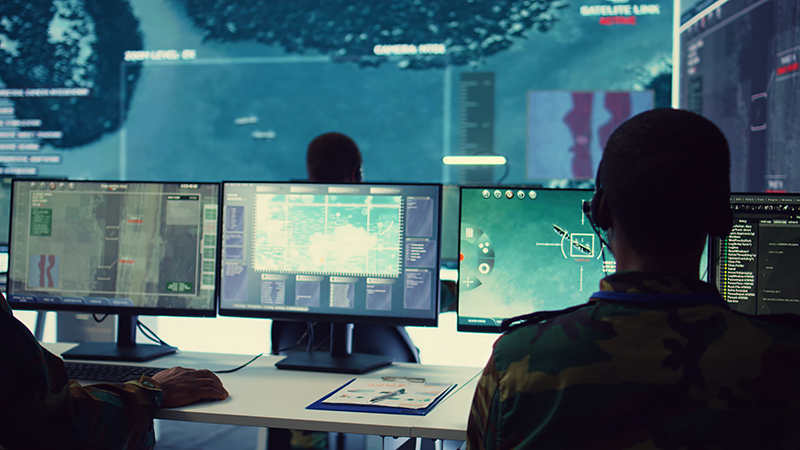Fund selectors who invest in mainstream indices are investing in controversial weapons by default, Swiss Sustainable Finance warns.
Indices such as MSCI World, S&P 500, and FTSE All World indices all include firms that contribute to the manufacture of controversial weapons, Swiss Sustainable Finance chief executive, Sabine Döbeli told Portfolio Adviser sister title Expert Investor.
Döbeli says the indices included controversial weapon companies such as Hanwha Corp, General Dynamics, Larsen and Toubro, Elbit Systems, Textron, and Northrop Grumman.
Controversial weapons include antipersonnel mines, cluster munitions, biological and chemical weapons, and nuclear weapons.
According to Swiss Sustainable Finance investment in companies linked to such weapons is against some national regulation and international conventions.
“Many investors who invest in passive funds and indices haven’t considered that they automatically own a share of such companies,” Döbeli says.
“While the topic is becoming more well known with investors actively addressing the issue to asset managers, the biggest issue is that excluding these companies in indices is not automatic.”
To avoid investing in these firms but still use passives, Döbeli says selectors need to ask for an index product based on an index but excluding controversial weapons.
“Some of the index providers have such indices on offer, but usually they are more expensive than the standard index,” she says.
Tracking error
According to Morningstar data, out of 76,462 funds domiciled in the UK, Luxembourg and Ireland, 4.6% of open-ended funds are invested in controversial weapons firms, and 0.5% of exchange traded funds (ETFs).
The ETFs with the largest involvement towards controversial weapons was iShares S&P 500 Industrial Sector ETF (32.3%), SPDR S&P US Industrials Select Sector ETF (31.9%), X MSCI World Industrials ETF 1C (20.8%), SPDR MSCI World Industrials ETF (19.96%), and ComStage Stoxx Europe 600 Industrial Goods and Services ETF (17.7%).
The largest ETF, iShares Core S&P 500 ETF at €27.95bn, had 3.1% of the fund involved in controversial weapons.
For open-ended funds, the fund with the largest involvement in controversial weapons is Schroder GAIA Sirios US equities E Accumulation at 17.2%.
This was followed by Veritas Global Real Return B (16.8%), GVQ UK Focus I (15.1%), GVQ Opportunities F (15.1%), and DWS Invest Smart Industrial Techs FC (14.5%).
A spokesperson for the Schroder GAIA Sirios US equities fund said: “The fund’s exposure is likely to comprise of the long positions in a small number of companies which manufacture weapon parts and a single position which specialises in defence. Our primary exposure to these stocks is to commercial aerospace.”
The largest open-ended fund, Pimco GIS Income E Accumulation at €51.6bn had a 0.23% involvement in controversial weapons.
MSCI World v MSCI World ex Controversial Weapons return three years to 15 February 2019

Source: FE Analytics
Over the three years to 31 January 2019, the MSCI World returned 32.7% compared to the MSCI World ex Controversial Weapons that returned 31.7%.
While excluding controversial weapons creates a tracking error Döbeli says this argument for including these firms in mainstream indices is weak.
“On average investors excluding controversial weapons companies exclude something like 15 to 30 companies. And if we talk about the 15 exclusions, we are somewhere around 0.2% or 0.5% of a total index that is excluded so the tracking error argument is not the strongest,” she says.
Pictet Asset Management’s Eric Borremans says that this small percentage could have contributed to the fact that many investors did not realise they were investing in controversial weapons.
“The fact that these companies tend to represent a small weight of global indices makes them a bit invisible,” he says.
“But there is a huge amount invested through passives that it becomes significant in terms of absolute amount of money being invested in such companies.”
Low transparency
Borremans says mainstream indices that included companies from the US, South Korea, and countries that had not signed the Non-Proliferation of Nuclear Weapons treaty – Israel, India, Pakistan, and South Sudan – would most likely contain firms that are involved in controversial weapon manufacturing.
However, Döbeli says there was no easy way to find out which indices included controversial weapons. She says selectors would have to screen the index for specific companies that they defined as “controversial”.
She notes that while selectors could find out whether a company was active in certain areas of controversial weapons the differentiation in definition came from which kinds of weapons they were looking to exclude.
“There are considerable definition differences when you compare research and the fact is it is not easy to find out about such activities. It’s definitely not easy to get this information from the companies either,” she says.
Last month, Swiss Sustainable Finance, Pictet, and 143 other asset managers, asset owners, wealth managers and service providers demanded FTSE Russell, Morningstar, MSCI, S&P Dow Jones Indices and Stoxx to remove controversial weapons from mainstream indices.
However, Döbeli says they have not received a response from any index providers yet.
For more insight on continental European investment, please visit www.expertinvestoreurope.com










